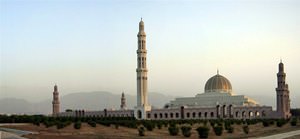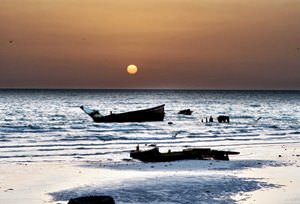
Oman is a desert country of hospitable Bedouins. The modest diet of local people has always consisted of a big portion of dates, camel milk, rice with spices, and weakish coffee. Even nowadays dates and greenish coffee are very popular, so travelers can easily find them virtually everywhere. In offices and houses, there is always a tray with dates. By the way, dates are eaten both fresh and dried. Local people drink coffee without sugar because the fruit is already sweet enough. However, it is impossible to imagine this drink without cardamom. As a rule, coffee is served in small glasses in order to keep it hot. There are two main types of Omani bread: a thin flatbread and a big and fluffy round loaf. Bread is consumed with many dishes. Many Omanis prefer to make bread at home, but it is also possible to purchase it in local shops, bakeries, and cafes.
A country of rich heritage and unique national traditions, Oman has managed to keep numerous historic landmarks, so there's no wonder why the country …
Read further
Beef and camel meat are the most popular meat types in Oman. Strips of salty meat are fried in fat; meat can also be cooked with spices in vegetable oil. Rice with spices, vegetables, and lamb meat, chicken or goat meat is a traditional family dish in the country. Locals often serve food in one big plate and everyone takes food with their hands. Sometimes, this dish is served with yogurt or lemon slices. Omanis like to cook meat and fish on the grill and are fond of picnics. All food comes with various spices that add a fantastic flavor and enhance taste. Marinated beef on a rack, fried yellowtail in lemon sauce, squid, crabs, and lobsters are the most favorite food in the region.
Persian limes are very popular in the country. Residents of Oman eat not only meat, dates, and rice. They also like cooking bananas, spinach cooked in coconut, and vegetable soups. Tomatoes stuffed with beans, carrot, onion, and other vegetables are also frequently present on the tables of local people. Red lentils are usually cooked with thyme, onion, and green pepper. Corn is usually boiled with mushrooms, sugar, and oil. Risoni pasta is served with spinach and nuts. Another popular dish in Oman, potato omelet with onion is nutritious and very simple to cook. Apples, peaches, grapes, cherries, papaya – it is possible to find all these and many other fruits in any market or supermarket in modern Oman. Copyright www.orangesmile.com
Arabs make up the majority of Oman’s population. East Africa has made a great impact on the ethnicities that live in the country, but descendants of …
Read further
Omani honey is a popular sweetener and a dessert. Dates are also present in many different desserts. Omani brown halva contains eggs, honey, rose water, brown sugar, saffron, and nuts. It is a popular dessert that locals eat with coffee. Halva can be not only brown but also white and yellow. Fried dough balls with cardamom are one more popular food that is consumed with coffee. When it is dessert time, locals prefer vanilla pudding with pistachios and cardamom syrup, as well as pancakes with honey and cardamom. It would be a mistake not to mention the dessert with carrots that contains condensed milk and ghee butter. Chocolate cakes also contain condensed milk, cardamom, and saffron. Such ingredients as caramel and vanilla are widely used in various sweets.
![Muscat Muscat]()
Thick yogurts with pistachios and cardamom are very popular in Oman. Leben or Laban is a popular yogurt with buttermilk, mint, and thyme. Black tea with sugar, condensed milk, saffron, and other spices remains one of the most popular drinks in the region. For big celebrations, such as weddings, locals often cook Shuwa – beef or mutton cooked in oil with black pepper and cloves. The meat is wrapped in banana leaves, put into a basket, and then slowly baked in an underground oven. The whole process takes one or two days. Harees is a festive dish, a meat soup with wheat.
Traveling aficionados rarely include Oman into a list of their must-visit destinations, and this is definitely a mistake. The country of deserts and …
Read further
In Oman, it is not common to cut all food on a plate into pieces and then eat them. Locals prefer to cut and eat one piece at a time. When someone is invited to a house of locals for an informal meeting, the guest will be offered dates and coffee. If hosts have time, they prepare for a visit and cook many different dishes. Do not point at someone or something with a knife, fork or another utensil as this is considered impolite in the country. In houses of conservative Omanis, women and children sit separately. Asking for more food is considered impolite, same as refusing the food offered. The majority of restaurants do not accept tips, and the one who invites to a restaurant also pays the bill. Pork is not eaten in Oman, and alcohol is banned. Do not blow your nose while having a meal. If food is served on one big plate, take food with your right hand only because the left hand is considered impure.
![Masirah Island Masirah Island]()
Tourists in Oman may prefer to dine in local restaurants and cafes because the food at hotels is usually quite expensive. In Muscat, tourists may find it interesting to visit Kargeen restaurant that specializes in traditional cuisine. The menu features a broad range of Omani dishes and drinks, as well as Shisha. Ubhar Bistro, which is also located in the capital, offers soups with fish and lentils, delicious halva and camel meat. Taybat restaurant has many options for vegetarians and vegans. All travelers wishing to find a European oasis in the middle of exotic Asia are always welcome in a pub that is open in Salalah. The pub is called the Oasis Club. It is one of a few venues in Oman that sells alcohol. The pub is particularly fun to visit if you come with friends.
 Oman is a desert country of hospitable Bedouins. The modest diet of local people has always consisted of a big portion of dates, camel milk, rice with spices, and weakish coffee. Even nowadays dates and greenish coffee are very popular, so travelers can easily find them virtually everywhere. In offices and houses, there is always a tray with dates. By the way, dates are eaten both fresh and dried. Local people drink coffee without sugar because the fruit is already sweet enough. However, it is impossible to imagine this drink without cardamom. As a rule, coffee is served in small glasses in order to keep it hot. There are two main types of Omani bread: a thin flatbread and a big and fluffy round loaf. Bread is consumed with many dishes. Many Omanis prefer to make bread at home, but it is also possible to purchase it in local shops, bakeries, and cafes.
Oman is a desert country of hospitable Bedouins. The modest diet of local people has always consisted of a big portion of dates, camel milk, rice with spices, and weakish coffee. Even nowadays dates and greenish coffee are very popular, so travelers can easily find them virtually everywhere. In offices and houses, there is always a tray with dates. By the way, dates are eaten both fresh and dried. Local people drink coffee without sugar because the fruit is already sweet enough. However, it is impossible to imagine this drink without cardamom. As a rule, coffee is served in small glasses in order to keep it hot. There are two main types of Omani bread: a thin flatbread and a big and fluffy round loaf. Bread is consumed with many dishes. Many Omanis prefer to make bread at home, but it is also possible to purchase it in local shops, bakeries, and cafes.
 Thick yogurts with pistachios and cardamom are very popular in Oman. Leben or Laban is a popular yogurt with buttermilk, mint, and thyme. Black tea with sugar, condensed milk, saffron, and other spices remains one of the most popular drinks in the region. For big celebrations, such as weddings, locals often cook Shuwa – beef or mutton cooked in oil with black pepper and cloves. The meat is wrapped in banana leaves, put into a basket, and then slowly baked in an underground oven. The whole process takes one or two days. Harees is a festive dish, a meat soup with wheat.
Thick yogurts with pistachios and cardamom are very popular in Oman. Leben or Laban is a popular yogurt with buttermilk, mint, and thyme. Black tea with sugar, condensed milk, saffron, and other spices remains one of the most popular drinks in the region. For big celebrations, such as weddings, locals often cook Shuwa – beef or mutton cooked in oil with black pepper and cloves. The meat is wrapped in banana leaves, put into a basket, and then slowly baked in an underground oven. The whole process takes one or two days. Harees is a festive dish, a meat soup with wheat.
 Tourists in Oman may prefer to dine in local restaurants and cafes because the food at hotels is usually quite expensive. In Muscat, tourists may find it interesting to visit Kargeen restaurant that specializes in traditional cuisine. The menu features a broad range of Omani dishes and drinks, as well as Shisha. Ubhar Bistro, which is also located in the capital, offers soups with fish and lentils, delicious halva and camel meat. Taybat restaurant has many options for vegetarians and vegans. All travelers wishing to find a European oasis in the middle of exotic Asia are always welcome in a pub that is open in Salalah. The pub is called the Oasis Club. It is one of a few venues in Oman that sells alcohol. The pub is particularly fun to visit if you come with friends.
Tourists in Oman may prefer to dine in local restaurants and cafes because the food at hotels is usually quite expensive. In Muscat, tourists may find it interesting to visit Kargeen restaurant that specializes in traditional cuisine. The menu features a broad range of Omani dishes and drinks, as well as Shisha. Ubhar Bistro, which is also located in the capital, offers soups with fish and lentils, delicious halva and camel meat. Taybat restaurant has many options for vegetarians and vegans. All travelers wishing to find a European oasis in the middle of exotic Asia are always welcome in a pub that is open in Salalah. The pub is called the Oasis Club. It is one of a few venues in Oman that sells alcohol. The pub is particularly fun to visit if you come with friends. 

